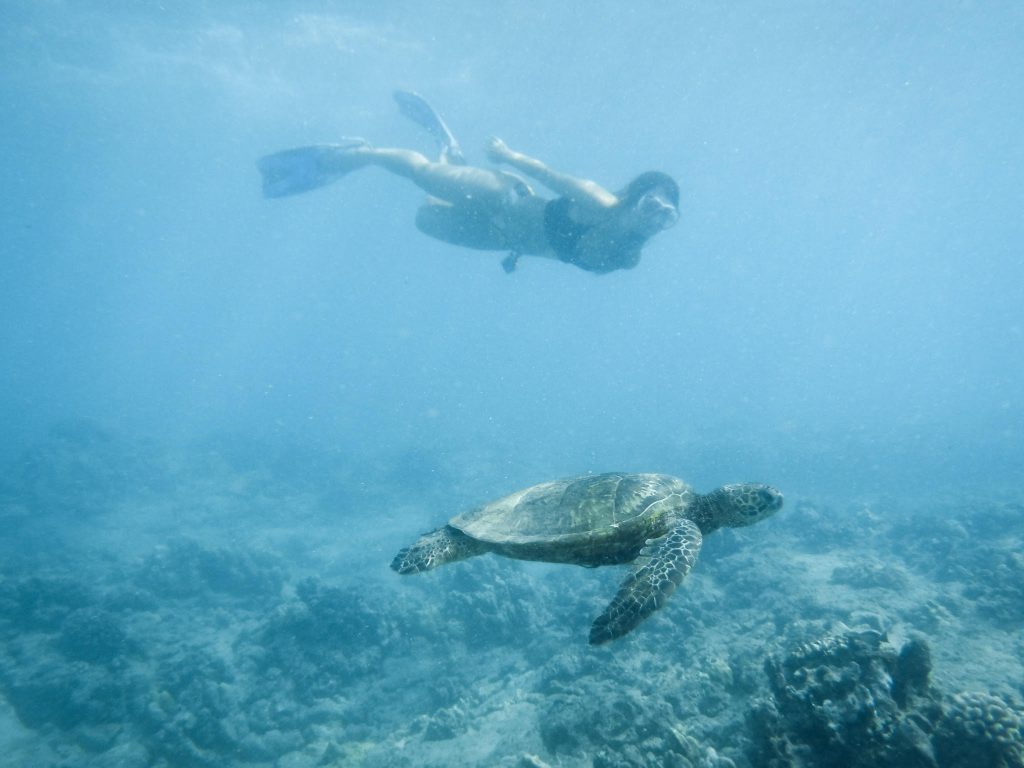From 2015 to 2016, there was an extreme coral bleaching event that wreaked havoc on ecosystems worldwide, but especially in western Hawaii, due to changes in ocean temperature.
Kelly Coyne, ‘20, received her bachelor’s degree in environmental science from Binghamton University and saw the bleaching event firsthand when she visited Hawaii through the National Student Exchange program with BU. The incident inspired Coyne to become more dedicated to environmental issues.
“When I showed up expecting to see these vibrant reefs, I ended up seeing just debris, bare rock face and white coral everywhere,” Coyne said. “It was devastating. It was just kind of that that sprung me into action, and I ended up working the following summer at a coral nursery, so basically I grew corals, and they were transplanted out onto the reefs.”
The work Coyne performed on reefs was in Summerland Key, Florida, where she and her team did outreach within the local community and took care of 40,000 corals at Mote Marine Laboratory & Aquarium. Now, Coyne is a U.S. communications intern at Oceana, a nonprofit organization dedicated to preserving the Earth’s oceans. Melissa Valliant, senior communications manager at Oceana, said Coyne is passionate about the work she does.
“Protecting our blue planet is challenging work often involving unexpected obstacles and powerful opposition, which is why it helps to have a true passion for it — and it was clear from day one that [Coyne] had that genuine zeal for ocean advocacy,” Valliant wrote. “Three months later, she’s become an integral part of the team, keeping careful record of our media hits, collecting assets for campaign materials, assisting with reports and even placing stories for Oceana’s campaigns”
Coyne works on tracking media, chasing stories and keeping up with a plethora of campaigns, including the illegal fishing campaign, the climate and energy campaign and the shark fin trade ban, among others. Coyne said she believes society needs science communications.
“Science communications are so important because you have to convey what’s happening on the other side of the world to people who will never witness that,” Coyne said. “Because if you don’t, then people aren’t going to change, people aren’t going to care and I think it’s a great example — right now, we’re looking at the wildfires and everything going on and people really rallying behind the idea that climate change is real, climate change is happening right now and that’s making a huge impact.”
Currently, there have been wildfires taking course on the West Coast and many have sounded the alarm, highlighting the fact that climate change and increased temperatures have allowed the fire to ravage the coast. During her time at BU, Coyne created her own blog called Point Source because she saw a gap between research and fieldwork and the public.
“I started my own science communications blog because I believe that even though there’s tons of valuable research and fieldwork going on, without proper communication of that, we’re leaving out such a large group of people out of the conversation,” Coyne said.
In addition, Coyne was a BU food sustainability intern, where she worked on a project to bring back reusable containers, which was ultimately scaled back. Coyne worked on a metal straw and utensils sale along with a vegan bake sale, the proceeds of which were donated to the Rainforest Alliance, an international organization dedicated to preserving forests, aiding farmers and stopping climate change.
Coyne works with plastics, one of Oceana’s largest campaigns. According to Sea Stewards, an organization seeking to protect the world’s oceans, 14 billion pounds of trash are dumped in the ocean annually, mostly comprised of plastic.
“Talking about specifically single-use plastics, almost 40 percent of all the plastics produced every year is for single-use, but it lasts for centuries and I think that’s a problem that a lot of colleges struggle with dining halls — utensils, takeout containers and stuff like that,” Coyne said.
She went on to say that universities, including BU, must take sustainability seriously as a priority in their agendas.
For her future, Coyne hopes to continue in science communications and holds a stern devotion to solving environmental issues.
“It can be pretty dark and hopeless sometimes and I think, as the younger generation, we have a host of problems that we’re inheriting, but it’s not too late and I think if we rally together, we can make a huge impact,” Coyne said.
Valliant expressed her own admiration for Coyne.
“Whether it’s keeping plastic out of our seas, stopping illegal fishing, preventing offshore drilling or ending the shark fin trade, [Coyne] brings her dedication and drive to every Oceana effort,” Valliant wrote. “Her scientific mind, attention to detail and willingness to always dive in have made her a valuable asset to our communications work.”
Kelly Coyne was a contributor for Pipe Dream from September 2017 to 2019.



